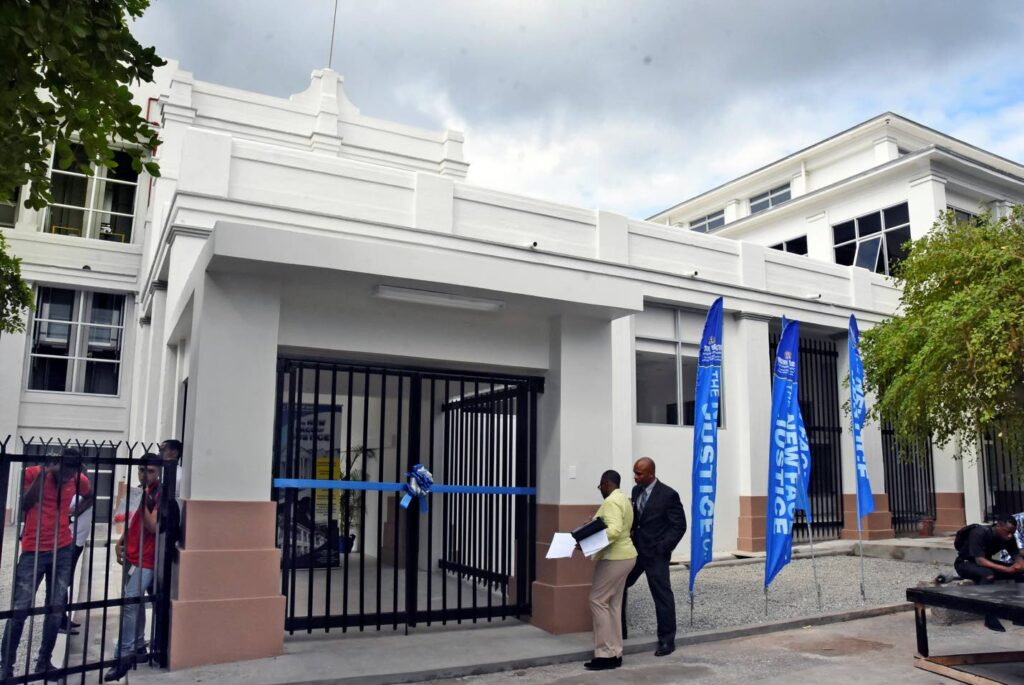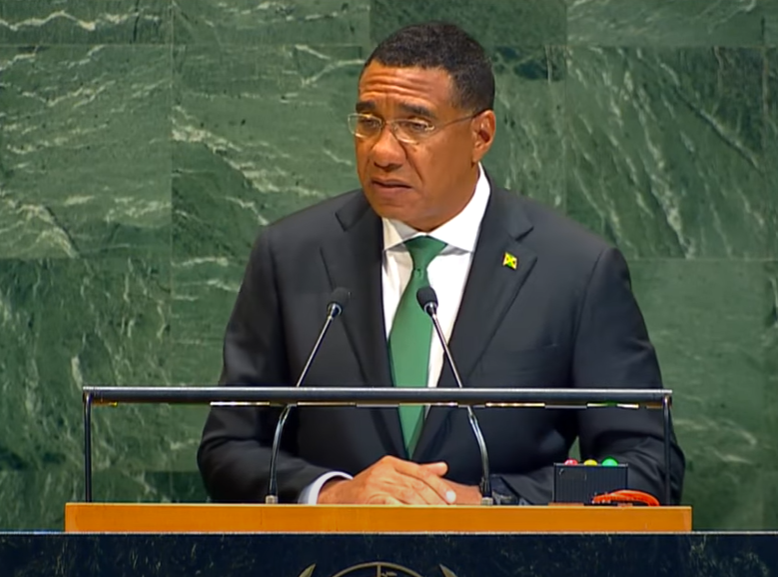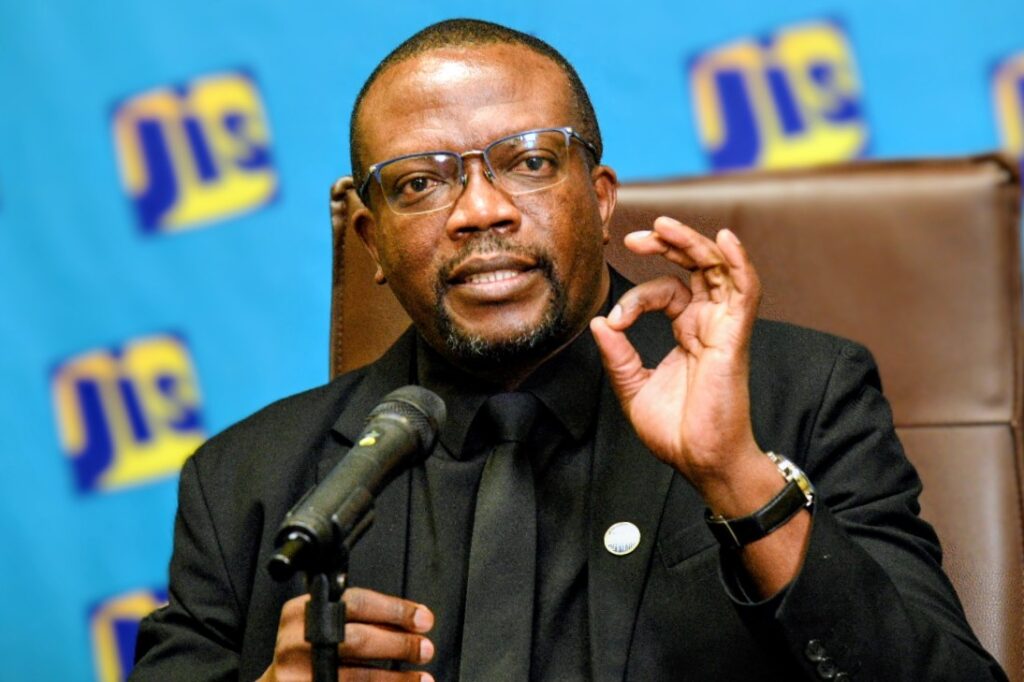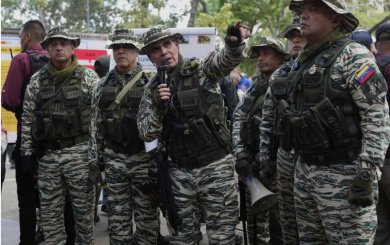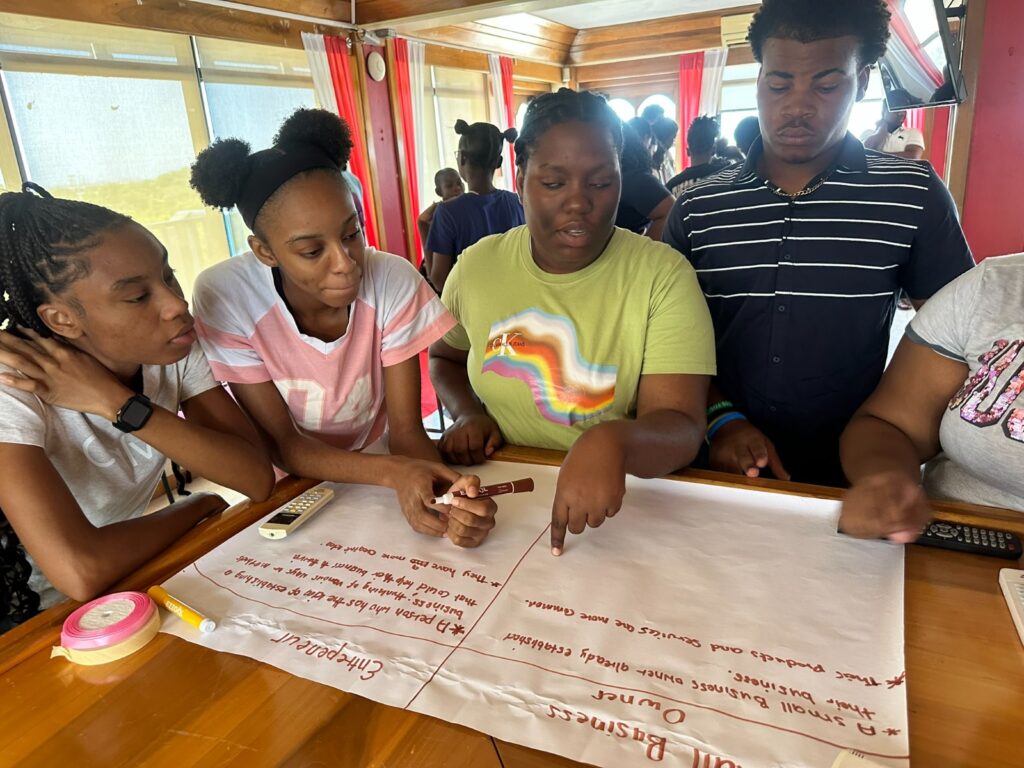Prime Minister Andrew Holness addressing the 80th session of the United Nations General Assembly
UNITED NATIONS (CMC)-Prime Minister Andrew Holness on Friday said that the crisis in Haiti has “laid bare a wider truth in transnational criminal networks trafficking arms and narcotics” as he called for a global war on gangs to deal with the situation.
Addressing the 80th session of the United Nations General Assembly, (UNGA), Holness said that gangs are now global syndicates with resources that rival nation states.
Holness, who is the current chairman of the 15-member regional integration movement, Caricom, said that the Caribbean has created regional security mechanisms, but these efforts alone cannot match the scale of the threat.
“What is needed is a united front, with the same urgency, resources, and coordination the world has applied to terrorism. Only then can we turn the Caribbean—and indeed the wider region—into a true zone of peace.”
Holness said that Jamaica has made significant progress in tackling gangs and reducing its homicide rate by more than 50 per cent in recent years.
“But we know that unless these networks are totally dismantled, our gains remain fragile. This is why we call for nothing less than a global war on gangs, a coordinated international campaign to cut off the flow of weapons, money, and influence that sustain them,” said Holness.
He said that this requires deeper engagement from all member states, urging full implementation of the UN Programme of Action on Small Arms and Light Weapons and the International Tracing Instrument. Major arms-exporting countries must tighten export controls, strengthen end-use monitoring, and ensure rigorous post-delivery verification.
“Equally, member states in our region and beyond must commit to intelligence sharing, joint operations, and technical assistance for law enforcement, border security, and port control,” he added.
Holness said that Jamaica once again condemns the heinous October 7, 2023 attack on Israel and deeply regrets the devastating humanitarian consequences of the counter-offensive in the Palestinian territories.
He said a just and peaceful resolution to the conflict is only possible through diplomacy and dialogue.
“We continue to support United Nations Security Council Resolution 242 and support the call for a ceasefire agreement that includes the release of all remaining hostages and definitively ends the protracted war and human suffering.”
He said political instability, gang violence, and humanitarian crises in Haiti, affect not only the Haitian people, but the entire region.
“As current chair of Caricom, Jamaica has led and participated in efforts to restore peace and constitutional order in Haiti. Last year, we welcomed, and participated in, the deployment of the Multinational Security Support Mission (MSS) to Haiti, and we commend Kenya’s leadership in this initiative.
“The security situation remains dire. As we contemplate next steps, we urge Member States, especially those in the Security Council, to operationalise the recommendations made by the secretary general for a transition to a more robust hybrid mechanism to deal with the situation in Haiti.
“We call on member states to provide the necessary financial and logistical support to ensure the success of this initiative. The cost of doing nothing would be unthinkable.”
But Holness acknowledged that security operations alone will not suffice.
“Haiti’s governance deficits and fragile institutional framework must be addressed. Once stability is restored, the international community must help rebuild democratic institutions, ensure free and fair elections, expand humanitarian relief, and invest in infrastructure to support long-term stability. Haiti’s recovery requires sustained global support.
“The Haitian crisis has laid bare a wider truth: transnational criminal networks trafficking arms, narcotics, and people are existential threats to states; organising violence, and destabilising institutions. Gangs are now global syndicates with resources that rival nation states.”
Holness said that last week, Jamaica marked 63 years as a proud member of the United Nations, reaffirming “our unwavering commitment to the principles of the UN Charter.
“Yet, as we confront global challenges including pandemics, climate change, armed conflict, and persistent poverty, we must acknowledge that our multilateral system requires urgent reform and revitalisation to meet the needs of the 21st century.
“The UN80 Initiative is an opportunity to strengthen multilateralism with concrete action, institutional reform, and renewed political will. We must build a system that is more democratic, representative, and responsive to evolving challenges,” he argued.
He said his country is honoured to be co-chairing the Working Group on UN80 Mandate Implementation Review, along with the Permanent Representative of New Zealand, and was looking forward to meaningful outcomes.
Holness said Jamaica believes in a future where multilateralism works for all, where no country is too small to be heard, where the concerns of Small Islands facing rising seas are addressed, where the benefits of globalisation are equitably shared, and where international cooperation is based on respect for the sovereignty of each nation.
“Climate Change is not a distant threat. It is a daily reality for Small Island Developing States like Jamaica. Frequent hurricanes, droughts, and erratic rainfall destroy infrastructure, displace communities, and set back decades of hard-won progress,” he stated.
He said Jamaica has committed to achieving net-zero emissions by 2050 and has implemented its National Adaptation Plan with specific measures to build resilience across key sectors and we are on track to achieve our renewable energy target of 50 per cent by 2030.
“However, our efforts, and those of other SIDS, are severely constrained by the lack of predictable and accessible finance. The promise of US$100 billion annually remains unfulfilled. The Loss and Damage Fund established at COP28 was historic, yet its initial capitalisation of $800 million is grossly inadequate.
“Developed countries must honour their commitments and scale up climate finance, recognising that adaptation is a necessity for the survival of SIDS. International financial institutions must integrate climate risk into lending decisions and develop new financing instruments to address climate vulnerability.
“The Seville Commitment offers a roadmap for transforming the global financial architecture to support climate action and sustainable development,” Holness said, noting also that the global financing system remains fundamentally flawed., penalising reforming economies like Jamaica with high borrowing costs while ignoring our vulnerabilities.
He said through sacrifice, discipline, and sound management, Jamaica has reduced its debt-to-GDP ratio from 144 to now 62 per cent and “yet we remain locked out of concessional financing because of outdated metrics based solely on per-capita income.
“Jamaica supports the application of the Multidimensional Vulnerability Index that more accurately assesses countries’ development needs and their eligibility for concessional financing.
“Jamaica also strongly supports innovative financing mechanisms, including debt-for-climate swaps, debt-for nature swaps, and blended finance instruments that can unlock private sector investment in sustainable development projects while reducing debt burdens,” said Holness.



